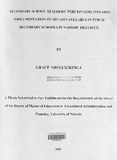| dc.description.abstract | The main purpose of the study was to investigate secondary school teachers'
perceptions toward implementation of HIV/AIDS syllabus in schools. The study sought to
determine:- the importance of HIV/AIDS syllabus to the learners, whether HIV/AIDS
syllabus was being taught separately or it was being integrated with other subjects and
establish whether teachers were inserviced to implement the HIV/AIDS syllabus in schools.
Lastly it sought to establish the problems that hinder implementation of HIV/AIDS syllabus
in school and possible solutions.
The subjects for this study were 249 teachers drawn from public secondary schools
in Nairobi province. Before the main study, a pilot study was conducted in five schools
which were not included in the main study. The pilot study led to the modification of the
research instruments. Some items were dropped while others were reworded. The
reliability of the perception items was 0.8.
A questionnaire was used as a research instrument and targeted secondary school
teachers as the respondents. The questionnaire was divided into three parts. The first part
sought demographic information of the respondents. The second part contained perception
items, and third part contained open ended questions.
It was hypothesized that teachers' personal qualities such as age, religion,
marital status, academic qualification and teaching experience played a significant role in
their perception of HIVIAIDS syllabus implementation. It was also hypothesized that
female and male teachers had different perceptions towards implementation of HIV/AIDS
syllabus implementation. The other hypothesis was that training of teachers in HIVIAIDS
syllabus implementation influenced teachers' perceptions.
A two-tailed t-test and one way analysis of variance (ANOV A) were used to test
the set hypotheses. The t-test was used to test Ho6 and Ho7. ANOVA was used to test Ho1,
Ho2, Ho3, Ho4 and HoS. The 0.05 significance level was used to both tests as a standard for
rejection or acceptance of null hypothesis. The study established that teachers' personal
qualities of age, academic qualification, religion, gender and teaching experience had no
significant effect on their perception towards implementation of HIVIAIDS syllabus.
However, significant difference between teachers' perception towards implementation of
HIV/AIDS syllabus and their training and marital status was found.
It emerged that only 11.4% of the teachers had been inserviced for the implementation
of HIV/AIDS syllabus in schools and 62.3% taught the syllabus in schools. The study
showed that teachers were not adequately informed about the role they were supposed to
play in implementing HIV/AIDS syllabus. The analysed data also revealed that the
HIVIAIDS unit of the Ministry of Education was doing little in organizing seminars and
workshops to acquaint teachers on matters pertaining to HIVIAIDS syllabus
implementation, and in providing necessary resource materials for implementing the
syllabus. It was established that the success of HIV/AIDS syllabus implementation was
hindered by students' and teachers' negative attitude, lack of trained personnel, inadequate
teaching facilities, stigmatization of the subject, cultural and social problems and lack of
sufficient time.
The study recommended the following: First that seminars, workshops or in service
courses should be organized for teachers, secondly Ministry of Education should play a
more prominent role in training, advising, co-ordinating and evaluating HIV/AIDS syllabus.
Thirdly, efforts should be made to persuade students and parents to take HIV/AIDS syllabus
seriously. Specific time for the syllabus in the timetable and resource materials should be
provided in schools for the HIV/AIDS syllabus implementation. | en |

